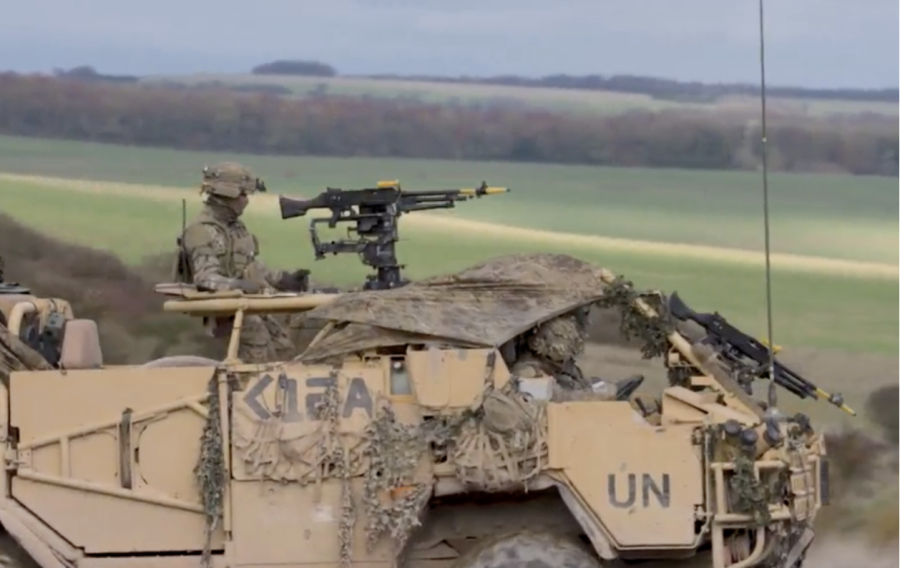
Thousands of troops have been involved in one of the largest military training exercises to take place on the Salisbury Plain Training Area (SPTA): Exercise Wessex Storm.
Exercise Wessex Storm takes place multiple times a year and involves approximately 1,500 to 2,000 troops from the army, and sometimes personnel from the Royal Air Force (RAF) over a two-week period.
Coming to a close last month, the exercise saw the culmination of weeks of planning and on-site support for DIO’s Defence Training Estate (DTE) staff on SPTA.
Planning and managing an exercise of this magnitude takes months of organisation and behind-the-scenes work, and it’s the DIO’s DTE staff that enable this to happen.
From an initial brief, the team are responsible for locating the right training area to meet the needs of the exercising troops, (in this case SPTA, which is the size of the Isle of Wight) allocating a specific location on the training area for each unit to exercise, and managing any conflicts should anything change.
The team also enables the logistics, food and accommodation for the troops and other supporting teams once they arrive on SPTA.
Once the training is underway, the team ensure that the individual elements of the exercise run smoothly, efficiently, and safely by offering on-site guidance and support.
It’s not only troop safety that is a priority during an exercise of this size: there could be implications for the public too, as the exercise takes place across the entire plain for two weeks and involves a lot of troops, fast moving vehicles and pyrotechnics.
The DTE staff take public safety on the training estate very seriously, as WO2 Mark Devlin, Training Safety Marshal for SPTA explains: “Public safety is a key priority for us. When an exercise of this size and complexity takes place across the plain, we have a responsibility to make sure that the public, as well as our exercising troops, are kept safe.
“We monitor the plain throughout the exercise, and if we come across any members of the public, we tell them that the exercise is taking place, how they might be impacted, and where they can find more information about how and when to access the area safely.
“Our key message to the public is that the training area can go from calm to combat in an instant. We encourage the public to make use of this beautiful area but to stick to the paths and rights of way, adhere to the signage and red flags, and to visit the GOV.UK website to find out when and where you can access the area safely.”
The aim of Exercise Wessex Storm is to provide troops with realistic, varied training focused on fighting in built-up areas and preparing for chemical, biological, radiological and nuclear warfare, as well as fighting in woods and forests. There are also opportunities to practice casualty evacuation without helicopter support.
Over 1,500 soldiers from the 7th Light Mechanised Brigade Combat Team (LM BCT) took part in the exercise. 7 LM BCT is the army’s deployable Light Mechanised Brigade.
The brigade consists of a light cavalry regiment, and four light-mechanised infantry battalions with supporting artillery, engineering, logistics, and medical regiments integrated into a BCT.
During the exercise, the Royal Scots Dragoon Guards (SCOTS DG) were challenged to prove their readiness to respond to international threats, supported by a company from the Royal Yorkshire Regiment, making up the combined arms Battle Group (BG).
Soldiers from three medical regiments and one Royal Electrical and Mechanical Engineer (REME) also took part to provide realism.
The exercise was broken down into a week of company-level live fire exercises, followed by a two-week field training exercise for the whole BG.
At over 38,000 hectares (94,000 acres), Salisbury Plain is the UK’s largest training area, and offers first-class and diverse training facilities that enable the British Army to meet its training requirements, and prepare for operations worldwide.
image © MOD Crown Copyright 2023
If you would like to join our community and read more articles like this then please click here
Defence Training Estate DIO Exercise Wessex Storm Salisbury Plain Training Area SPTA







